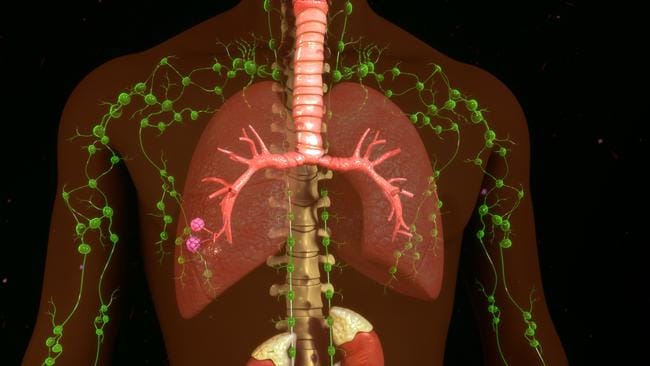 The lymphatic system is a vast and complex network of nodes, vessels and fluids connected to every part of your body.
The lymphatic system is a vast and complex network of nodes, vessels and fluids connected to every part of your body.
Feeling bloated, tired and sluggish? The reason may surprise you. These are all signs that your lymphatic system is not working well – and you need to pay it more attention.
Researchers are only now beginning to understand how this long-overlooked system – a vast and complex network of nodes, vessels and fluids connected to every part of your body – works. And scientists are discovering that it plays a significant role in everything from disease prevention to improved digestion and energy levels.
“For years even the medic al profession thought the lymph system was just a waste disposal system that served no additional purpose,” explains Dr Gerald Lemole, a cardiothoracic surgeon and the author of a new book, Lymph & Longevity: The Untapped Secret to Health. “It was overlooked and disregarded until gradually science has shown it is involved in every organ and process of the body.”
al profession thought the lymph system was just a waste disposal system that served no additional purpose,” explains Dr Gerald Lemole, a cardiothoracic surgeon and the author of a new book, Lymph & Longevity: The Untapped Secret to Health. “It was overlooked and disregarded until gradually science has shown it is involved in every organ and process of the body.”
Now he is on a mission to make us all more aware just how important it is.
In his book, Lemole describes the lymphatic system as a “secret river” of colourless fluid that flows through the lymph vessels, the tiny tubes of the body’s lymphatic system, carrying nutrients and important chemical messages to the brain and other organs.
This network of vessels connects to lymph nodes in the neck, armpits, stomach and groin which act as a filter, trapping or destroying toxins that predispose us to health problems. Inside these lymph nodes are lymphocytes, white blood cells that attack or break down viruses, bacteria and cancer cells.
Meanwhile the lymph fluid ferries toxins and waste products to the liver and kidneys, where they are excreted from the body.
Unlike the cardiovascular system, which has the heart to pump blood around the body, the lymphatic system has no central engine to keep it functioning well. Instead it relies on muscle action. Lymphatic vessel walls are lined with smooth muscle tissue that contracts as we move to push lymph fluid along.
Lack of exercise, inactivity and poor nutrition cause lymph flow to slow down. And when the lymph system becomes sluggish, the metabolic waste and toxins that aren’t being eliminated can start to cause inflammation of the body’s tissues, which leads to fatigue and joint pain and is associated with conditions such as type 2 diabetes and arthritis.
 Researchers have shown a link between impaired lymphatic vessels in the brain and increased levels of amyloid-beta deposits that are associated with Alzheimer’s disease. When cancer cells spread from a tumour they may get stuck in lymph nodes, which is why they are checked when cancer is diagnosed.
Researchers have shown a link between impaired lymphatic vessels in the brain and increased levels of amyloid-beta deposits that are associated with Alzheimer’s disease. When cancer cells spread from a tumour they may get stuck in lymph nodes, which is why they are checked when cancer is diagnosed.
“The lymph system works with the rest of our immune system to keep cancer at bay and slow the spread of the disease,” Lemole says.
“Natural killer cells and other immune cells travel via lymphatic fluid so if your lymph flow is stagnant you are decreasing the chances that those disease-fighting cells get to the site of where cancer cells are replicating.”
What your lymph system needs, Lemole says, is “some help to move things in the right direction and promote strong flow”. That help includes diet, exercise and relaxation techniques.
“Think of the lymph system as your body’s maintenance department,” Lemole says. “We need to constantly work on it to keep it in good condition.”
Here’s how:
Have a 15-minute sauna (or a hot bath)
 Saunas are a great way to get the lymph flowing, Lemole says, and once a week is best but even taking one once a month is beneficial. If you don’t have access to a sauna, a hot bath or shower will do. “Sitting in the heat can help to get lymph fluid moving along because it widens vessels and improves circulation, while sweating helps the body to get rid of toxins,” he says.
Saunas are a great way to get the lymph flowing, Lemole says, and once a week is best but even taking one once a month is beneficial. If you don’t have access to a sauna, a hot bath or shower will do. “Sitting in the heat can help to get lymph fluid moving along because it widens vessels and improves circulation, while sweating helps the body to get rid of toxins,” he says.
Add herbs and spices to your meals
Lemole recommends adding cayenne, cinnamon, oregano, basil and turmeric to your food because they are among the herbs and spices to contain compounds such as curcumin, eugenol and limonene that relax your lymph vessels and improve overall flow. Some herbs that can be taken in supplement form have been shown to have particular lymph benefits. “In trials, Siberian ginseng has been shown to strengthen the endothelial cells that line the lymph system,” Lemole says.
Try humming or singing
Research has shown that humming, singing or yoga chanting boosts lymph flow, Lemole says. “Because you are relaxed when you sing, your lymph vessels dilate, allowing more fluid to flow through them. Try to get into the habit of humming when you sit.”
Have a massage once a month
 Massage helps to improve overall flow of the lymphatic system, gently moving blood lymph and nutrients and assisting with the removal of waste products. A deep-tissue or sports massage helps to target larger lymphatic tubes. “Even a simple DIY massage is good if you direct your movements towards the heart, to mimic fluid flow,” Lemole says. “It can greatly help circulation.”
Massage helps to improve overall flow of the lymphatic system, gently moving blood lymph and nutrients and assisting with the removal of waste products. A deep-tissue or sports massage helps to target larger lymphatic tubes. “Even a simple DIY massage is good if you direct your movements towards the heart, to mimic fluid flow,” Lemole says. “It can greatly help circulation.”
Bounce on a mini-trampoline
Jumping on a mini-trampoline (or rebounder) for just a few minutes a day is one of the most effective ways you can boost your lymph system, Lemole says. “Your lymph fluids succumb to the push and pull of gravity so that they are moved along four times faster than they would be if you were walking and about 15-40 times more than if you were sitting. Just doing 50 jumps daily can have a powerful impact.”
Practise yoga
Whereas bouts of intense exercise help to generate the flow that’s essential for lymph health, yoga encourages better fluid circulation. “In yoga, muscles are loosened and the hormones released when muscles relax help with the flow, while the variety of different positions help to send lymph fluid in different directions to where it is needed,” Lemole says.
Eat more blueberries, pomegranates and nuts
 Berries, pomegranates, extra virgin olive oil, flax seed and nuts are packed with the beneficial plant compounds polyphenols which are described by Lemole as “lymphagogues” – meaning they help to dilate and contract lymph vessels, so everything flows more smoothly. Blueberries are rich in pterostilbene, a polyphenol that is particularly beneficial.
Berries, pomegranates, extra virgin olive oil, flax seed and nuts are packed with the beneficial plant compounds polyphenols which are described by Lemole as “lymphagogues” – meaning they help to dilate and contract lymph vessels, so everything flows more smoothly. Blueberries are rich in pterostilbene, a polyphenol that is particularly beneficial.
Aim for 30g fibre a day
Most of us don’t eat enough fibre. Increasing the amount you consume by eating plenty of vegetables, fruits and seeds you will not only help to boost digestive health but help the lymph to absorb fats, helping to reduce high levels of fats in the blood. “We all need to get more fibre in our daily diets,” Lemole says.
Run, swim or cycle several times a week
 Bouts of intense exercise, such as faster-paced aerobic activity or interval training are great for your lymph health. “We know that exercise can improve lymph flow from threefold to sevenfold above resting level,” Lemole says. “Muscle contraction during exercise gently massages the lymph fluid, pushing it along,” Lemole says. “And the harder you work, the more you sweat, which helps to clear toxins from the body.”
Bouts of intense exercise, such as faster-paced aerobic activity or interval training are great for your lymph health. “We know that exercise can improve lymph flow from threefold to sevenfold above resting level,” Lemole says. “Muscle contraction during exercise gently massages the lymph fluid, pushing it along,” Lemole says. “And the harder you work, the more you sweat, which helps to clear toxins from the body.”
Drink at least one litre of water a day
Water is essential for thinning the consistency of lymphatic fluid, so it moves more easily. “Make it plain water and aim to drink the amount that ensures your urine is clear and pale in colour,” Lemole says.
Get seven hours of sleep (and sleep on your side)
Sleep is hugely restorative, allowing the body time to repair and clear out toxins from lymph fluid. “Try to get a minimum of seven hours regularly,” Lemole says. “And try to sleep on your side at least some of the time as it boosts lymph flow.”
Practise deep breathing
 The largest lymph vessels and main lymph channels are located in your chest. “Whenever you take a deep breath, the movement and muscle contractions involved help to ferry the lymph fluid along,” Lemole says. “The deeper your breathing, the better the circulation of lymph fluid you achieve.” He suggests taking a few minutes each morning and evening to practise deep, slow breathing.
The largest lymph vessels and main lymph channels are located in your chest. “Whenever you take a deep breath, the movement and muscle contractions involved help to ferry the lymph fluid along,” Lemole says. “The deeper your breathing, the better the circulation of lymph fluid you achieve.” He suggests taking a few minutes each morning and evening to practise deep, slow breathing.